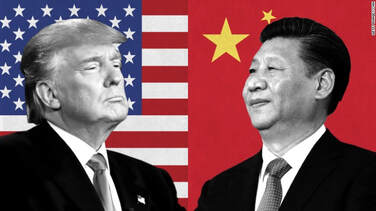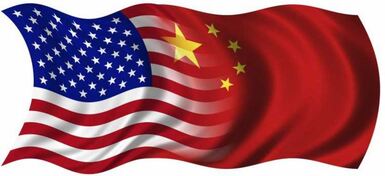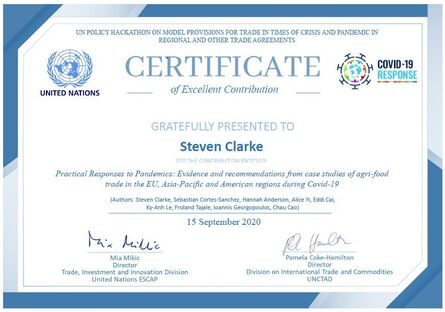Publications
|
The Art of War and the Art of the Deal:
Analyzing the US-China Trade Dispute through a Negotiation Lens Abstract:
The negotiation strategies adopted by the US and China in the current trade dispute are examined in this paper. While opportunities remain significant for Chinese and American trade cultural differences remain significant and these are contributing to difficulties in finding a negotiated solution to the trade dispute. Current strategic negotiations in terms of potential trade wars/disputes and overall foreign policy are big news, because they have global economic implications. In this paper the elements of Confucianism, Guanxi, Sun-Tzu’s Thirty-Six Stratagems, strategy reversals, are examined and an overview of differences between ways of thinking, and approaches to negotiations adopted by China and the US are considered. We clarify some economic risks that continue to evolve around political, economic, religious, military, trade, and social factors including language and communications. This review highlights the value and importance of understanding cultural differences as US President Donald Trump and Chinese President Xi Jinping continue to negotiate a solution to the trade dispute. Honesty in Chinese/American Cross-Cultural Business Negotiations
|
Practical Responses to Pandemics: Evidence and recommendations from case studies of agri-food trade
in the EU, Asia-Pacific and American regions during Covid-19 Introduction:
Food trade during a pandemic presents a special case. Agricultural and food products typically have less-integrated global value chains than do other traded goods at the product level, although agricultural supply chains are enormously complex at the industrial level. Pandemics will also affect countries’ agricultural sectors differently depending on the pandemic’s origin and spread. As the COVID-19 pandemic spread, it became clear that it has the potential to significantly disrupt the world’s food supply. Supply and demand shocks resulting from the COVID-19 pandemic, and government efforts to contain it, have put a strain on agricultural supply chains. A complex network of workers in the fields, inputs like fertilizer and seed, and processing and distribution chains are required to get food from seed to plate. This network has been disrupted by a lack of workers, port closures, and logistics hurdles. This paper examines some of these disruptions through a series of case studies which, collectively, offer a model policy template for multilateral policymakers to ensure a stable global food supply during a pandemic. Taken individually, each chapter proposes a specific set of recommendations to tackle barriers to food trade during the COVID-10 pandemic, some of which have little to do with import or export controls. Pandemics highlight how, in an emergency, facets of policy not explicitly related to trade have a way of controlling whether or not global trade can function at all. Policy that does not explicitly regulate trade in normal times can become trade policy in a pandemic as individuals come to realize how dependent they are on trade. While no country exceeds 10% of the world’s total exports or imports of foodstuffs, trade in food is increasingly important for meeting our nutritional needs. 20% of the calories the average person consumes crosses at least one national border, an increase of over 50% since 1980. Seventeen of the eighty countries monitored by the WTO Secretariat have enacted export restrictions to foodstuffs trade in response to COVID-19. To date multiple governments have attempted to address some of these challenges. As policymakers develop strategies to limit the spread of the virus within their borders and to strengthen domestic food security, they should endeavor to avoid aggravating existing market distortions or creating disruptions to the food supplies of other nations. In this respect, agricultural policy represents a particularly challenging area. Multilateral and regional governance institutions and frameworks are not sufficiently comprehensive to protect the flow of financing, goods, information, and people essential for the purchase, production, transportation and distribution of agricultural products. Nevertheless, a growing number of Regional Trade Agreements (RTAs) and commitments within multilateral efforts have the potential to address country, region and product specific constraints to the development of open and sustainable food supply chains. To ensure policy makers and trade negotiators have a better understanding of the institutional, macroeconomic, and industry factors required for the development and protection of open and resilient agricultural supply chains during a crisis like COVID-19, this report contains detailed and evidence-based assessments of the advantages, limitations and shortcomings of unilateral or trade-bloc actions in response to the COVID-19 crisis and their likely impact on agricultural supply chains across multiple geographies. The nine chapters in this report leverage trade, regulatory, and macroeconomic data from the EU, Asia-Pacific, and Americas regions to provide practical policy recommendations for handling the COVID-19 crisis and future pandemic-related disruptions. The evidence presented herein is grounded in the trade, financial, logistical, macroeconomic and institutional realities faced by stakeholders in the agricultural policy response to COVID-19. Combined, these chapters cover policy responses across a diverse set of geographic, institutional and macroeconomic contexts, and thus provide policy assessments and recommendations spanning several trading relationships and institutional arrangements. Chapters 1 and 2 assess policy and regulatory crisis management measures developed within the context of two important regional economic blocs; the European Union and the Association of South-East Asian Nations (ASEAN). In Chapter 1, Ioannis Georgopoulos identifies crises management gaps within the European Union’s Single Market Agreement and assesses the effectiveness of practical remediations enacted by the European Commission amidst the COVID-19. In Chapter 2, Froland Tajale examines the scope and effectiveness of ASEAN policy and regulatory measures intended to narrow the regulatory gap between ASEAN Member States and ensure continuity in agri-food trade during the COVID-19 pandemic Chapter 3 and 4 assess the relevance and effectiveness of different types of bilateral efforts to remove agricultural barriers to trade erected in response to the COVID-19 crisis. In chapter 3, Ky Anh Lee evaluates the impact of the COVID-19 on EU-Vietnam trade relations and the effectiveness of trade facilitation measures under the EU-Vietnam Free Trade Agreement (EV FTA). In Chapter 4, Chau Cao uses the New-Zealand - Singapore Declaration on Trade of Essential Goods and Services to evaluate the coverage, depth, and effectiveness of ad-hoc cross country collaborations to reduce barriers to agricultural trade amid a global crisis. Chapters 5 and 6 examine the relevance and effectiveness of unilateral ancillary policy decisions by two of the world’s largest agricultural markets—US and China—in reducing supply-side disruptions to national and bilateral agricultural trade. In Chapter 5, Hannah Anderson investigates disruptions to the agricultural labor market in the U.S. from policies regarding migrant workers and health risks faced by the agricultural labor force. In Chapter 6, EddiE Cai examines the Chinese government’s countermeasures to manage disruptions in China’s value chain through the digitalization of the agricultural value chain and the strengthening of E-commerce channel capabilities. Chapter 7 explores cross-cutting trade and supply chain finance requirements, instrumental for the resilience of agricultural supply chains during a crisis. In this chapter, Alice Yi provides a policy response framework for assessing the health of trade finance resources, governance, and financial infrastructure during a crisis. Chapter 8 and 9 provide a critical overview of the depth and coverage of WTO and RTA provisions in the context of supply and demand side challenges associated with pandemics like Covid-19. In Chapter 8, Sebastian Cortes explores whether agriculture provisions in recent RTAs--especially new agreements like the CPTPP, USMCA and EU-Asia agreements--address supply side and demand side challenges associated with pandemics like Covid 19. In Chapter 9, Cortes develops model principles for the development of RTA provisions relevant to agri-food trade in the context of different institutional governance and economic arrangements by leveraging the issue-specific insights and recommendations from Chapters 1 - 7 and the RTA analysis from Chapter 8. This serves as a guide for the incorporation of RTA provisions and policy measures highlighted throughout this volume into ongoing and future RTA negotiations. Collectively, this work can serve as a guide to policymakers seeking to rebuild the global trading system in the aftermath of the COVID-19 pandemic in a more resilient manner. It is equally important to both identify the obstacles to smoothly-functioning trade during a pandemic and to offer policy recommendations which, if implemented, could either prevent these issues from arising during a future global emergency or establish a policy roadmap so that those responding to the crisis know immediately how to respond. We believe this compendium offers such a guide through its multi-faceted approach and cross-regional study and hope the recommendations herein spur thoughtful discussion among policymakers. Chinese/American Cross Cultural Business Negotiations Literature Review
|
|
Abstract:
The following literature review evaluates categories, strategies, and styles of cross-cultural negotiations that have contributed to the imbalance and high failure rates in international negotiations between Chinese and American executives. These formative articles feature cross-cultural negotiation investigation (by the scholarly and business community) into behavioral links between various categories in the ethical decision-making process based on variables in nationality and culture. These persuasive articles represent insight by various means throughout the research, addressing cultural elements. Exemplified in these studies incorporate the element of predisposition, including a lack of understanding and empathy by American executives of Chinese values and how they are practicable in business. Materialization of Chinese concepts including Guanxi (social networking), Sun Tzu, Confucius, ethics, hypocrisy, and more, adding to the foundational theory development in efficacious Chinese/American cross-cultural negotiations. |
Challenges of Multinational Enterprises Conducting Global BusinessAbstract:
The purpose of this paper is to provide a manuscript for the initial evaluation of international economic considerations facing Multinational Enterprises (MNEs) of all sizes, prior to entering a new foreign market. The problem for global business managers is the negative impact that results when foreign managers do not recognize and accommodate the differences between regional and global strategies. Hypocrisy, Ethics, and Deception in Chinese/American Cross-Cultural Business Negotiations (Pending)Abstract:
The formation and evaluation of hypocrisy, moreover moral hypocrisy is synonymous with deceit, deception, lying, fraud, unethical, dishonest, and misrepresentation of information, all leading to bad faith or mistrust. This paper endeavors to dissect key elements of motivation and relative issues influencing the use of deception and/or morally hypocritical behavior in cross-cultural negotiations whether a result of cultural diversity and/or ethical relativism. |
Challenges of the International Negotiation and Decision-Making ProcessAbstract:
The purpose of this paper is to examine the challenges of international negotiations and the decision-making process. Global companies’ negotiations vary from domestic qualities, tend to be more complex and include all forms of strategic alliances, each with separate goals, cultures, socio-economic, political, legal, and prejudices. Successful negotiations require advance preparation, effectual strategy, and efficacious execution. Success in negotiations and resourceful decision-making is not just about winning and losing, and is not always measurable. Negotiating parties have different styles and definitions of success. China Silk Case StudyIntroduction:
The purpose of this paper is to examine the impact of globalization on The People’s Republic of China (PRC) as it influences multinational corporations (MNC) management strategies going forward. Further, to investigate and explore the MNCs international strategic management and decision-making process when entering or expanding business in China. Analysis will include markets, investment, production, and technology as they influence strategic categories of culture, ethics, economics, politics, strategic alliances, human resources, supply chain, distribution channels, and financial management. For the purpose of this paper, the MNC is a global brand; China Silk Inc. (CSI) China Silk Inc. management is looking to add China as both additional sourcing and as a consumer market as part of their global strategy. China Silk Inc. is planning to open a subsidiary in China based on research and investigation through this analysis. Understanding and strategic planning for China is unique, as “The Chinese model of development in globalization is far from being a successful model applicable to other developing countries” (Yue, 2012). |
China Market Entry Overview for Foreign EnterprisesAbstract:
Since 1979, the People’s Republic of China (PRC) has continued to progress economically both domestically and internationally, creating a vast new market for foreign business entities wishing to enter the PRC. Although this success is evident, foreign organizations face significant hurdles based on cultural habits of the Chinese that challenge western concepts and strategies for business development. Investigation and evaluation of 12 academic peer-reviewed sources considered the subject of what role ethics play in foreign managers developing business in the (PRC). In this study, examination by cross-cultural, Guanxi and socialist groupings helps identify some current views of the impact of ethics as they relate to business managers impediments in developing business in the PRC. The results of this review suggest the assessment that most literature to date is western scholarship based and that significant additional dual directional academic based research is necessary in order to develop strategies for dealing with ethical issues when opening and expanding the China market. Strategies for Ethical Business Practices in the Global Market PlaceExecutive Summary:
The central problem is globalization and international marketing ethics creates problems and negatively effects opportunities in global markets. Westerner managers wishing to take advantage of global economic growth have had difficulty in understanding the cultural differences between these foreign cultures and the west; and have negative influences on effective negotiations and strategic planning with their foreign counterparts. These processes spearhead the increasing integration of the production of goods, services, ideas, culture, communication, and the environment, effecting local populations and labor |










